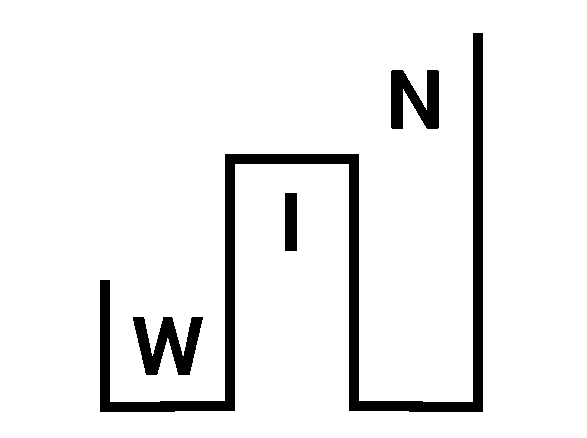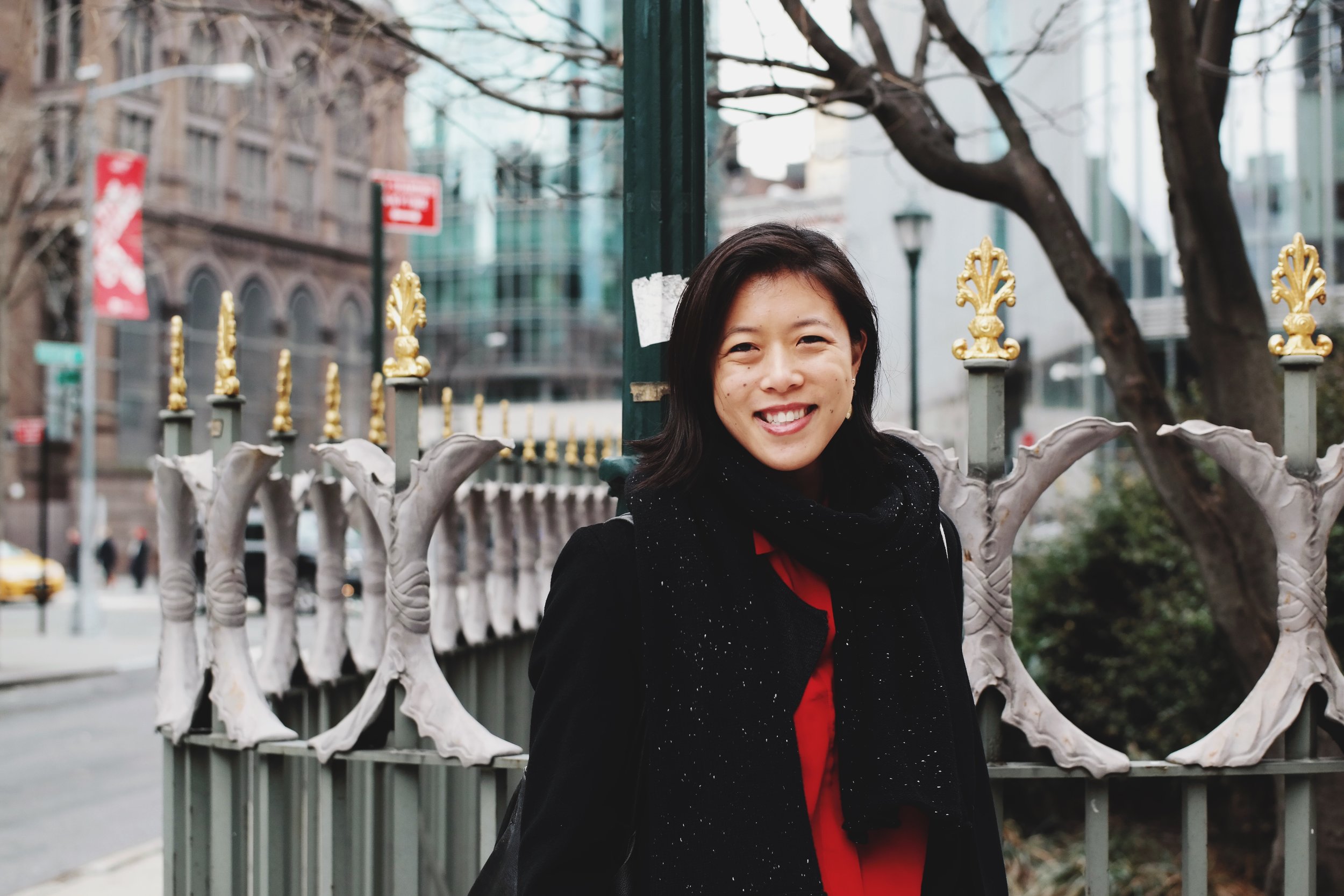WIN Spotlight: Justine Lai
Welcome to the second edition of "WIN Spotlight", a monthly series that celebrates an inspirational woman in our community. Each interview features a Women in Innovation member who is championing innovation at her organization. We dig into the diverse perspectives, influencers, missions, drivers, and dreams of these leaders, and of course share practical tips.
We couldn't be more delighted to feature Justine Lai, Co-Owner and Change Lead at August Public, long-time supporter of Women in Innovation, and one of the chapter leads of soon-to-launch WIN London (more on that soon! Stay tuned.) We caught up over coffee in the East Village on a chilly winter morning.
Who are you and what do you do?
I work at August, a future of work consultancy based in NYC and London, where I help leaders and teams transform the way they work in the face of massive uncertainty and change. August is unique as a consultancy in that we have a co-ownership model where I also own equity in the business — an option that is open to all team members after the first year. Internally, I hold roles on our Offering, New Partnerships, Resourcing and Finance/Ops teams, where a big focus of mine has been helping to embed data-driven decision-making into how we work and evaluate our impact.
As a fun sideline, inspired by a recent WIN event, I’ve also re-started a creative project to explore the relationship between beauty, accessible fashion and style via @paperbagstyle on Instagram. Teaser — it features people in their favorite outfits with paper bags over their heads. Check it out!
What are the life moments that most influenced who/where you are today?
For much of my early life, I was a serious pre-professional ballet dancer, which informed my passion for creativity as a fundamental and necessary part of my life. Starting in high school, I studied for three summers in NYC with Joffrey Ballet and American Ballet Theatre which sparked my love for the city — the possibility, the energy, the constant challenge and stimuli. I moved here for college to pursue my dream of becoming a dancer, and while I soon realized that dream wasn’t realistic, being at Barnard was game changing. Only after I graduated and entered the workforce did I realize how unique it was to be within a powerful female environment where I was constantly told that anything was possible and that I could do or be anything I wanted. I was continually challenged to figure out what my passion was and to pursue it wholeheartedly — but also to take responsibility for the privileges I had been given and use it to make a meaningful impact.
If you had to choose one, who is the woman who most inspires you? Why? (Go beyond the obvious heroes!)
As obvious as it may be, my mother has been a powerful source of inspiration in my life. Raised by a single mother in 1950’s Hong Kong after fleeing from China in the early stages of the Cultural Revolution, she came to the US for college on a full scholarship. She went on to get her PhD and MBA and eventually became a successful biotech entrepreneur. She taught me that perseverance and grit can go a long way but that it’s also important to understand the role of chance and luck in determining success — of her siblings, she was the only one to escape the full devastation of the Cultural Revolution — and that I should never take my privileges for granted.
What is the best advice someone has given you?
I got this advice many years ago but Sheryl Sandberg also spoke to it in “Lean In.” Some people think of their career as a ladder, but a better way to think about it is a jungle gym — there’s no straight path, only a series of zig zag climbs and steps towards the top. The trick is to find a theme that underlies your climb to guide your ascent. Once you find your theme, you should just trust your gut and not be afraid to take big leaps that scare you along the way. Through my career across psychology research, human services, and Fortune 100 consulting, my core theme has been helping organizations articulate and bring to life new business models and org structures that position them for greater social impact.
What is your creative ritual?
I have some of my best ideas during yoga — I find that the physicality helps me to push the non-essentials away so that I can let my subconscious bubble up ideas and solutions to problems I’m thinking about to the top.
I’m also deeply inspired by the creative communities I belong to, including Women in Innovation, the Design Gym, and current and former members of the Wharton Innovation & Design club. Even as an introvert, I get tremendous energy from meeting and swapping ideas with creatively-minded people who love learning about new things, thinking about the future, and are open to all possibilities.
What do you never leave the house without and why?
My signature sunglasses ring that I never take off. I bought it during a summer that I lived in Berlin a number of years ago. Before I went, many people I deeply respected and trusted told me it was a career-ender (or at the very least, MBA-application killer) to quit my job and move to a foreign country, however temporary. Yet it ended up being transformative on both a professional and personal level — and, I got my MBA at Wharton and ended up where I am today! My ring is a continual reminder to trust myself, don’t be afraid to take risks, and to treat life as a never-ending adventure.
What is the last book you read and why?
Growing up in the heart of Silicon Valley with a father and uncle who worked for Intel for 30+ years, I grew up hearing about the legendary Andy Grove. I recently read High Output Management, which by now is more than 30 years old but has critical lessons on leadership that are still relevant today — how to make decisions in the face of uncertainty, empower your people and distribute authority, and how to scale leadership impact across an organization.
On the fun side of things, for anyone out there who happens to like Victorian steampunk fantasy adventure, I also just finished reading the Parasol Protectorate series by Gail Carriger. Silliness and fun combined with subtle commentary on our society today.
What is your favorite app and why?
I’m the type of person who will write down something I’ve done after the fact just so I can have the satisfaction of checking it off, so Momentum is a great app I love to that helps me track my daily progress towards my personal goals (exercise, diet, physical therapy, etc) — I’ll do one of my healthy behaviors just to hear the little ding when I check it off. It’s all very Pavlovian. On the other end of the spectrum, I love Calm as an app for regular meditation and its great Sleep Stories to help lull me to sleep.
What is your favorite podcast and why?
I have to confess, I’m not a big podcast listener — something that I’ve been told is very old-school in today’s digital day and age. I love the randomness of radio (NPR, specifically) and how you never quite know what you’ll get. But when I do listen, Emergent Agenda, August’s podcast series, is top of my list. Even though I’m immersed in our day to day, I always find I learn new and interesting theory on our work and random fun facts about my team members I never knew!
Name a fundamental human truth you recently realized.
Everyone is capable of change. Whether or not they want to change is another story.
What product, service, or industry do you think is most ripe for innovation? Why?
When I worked in mental health, the joke we always made was that healthcare is 10 years behind all other industries — and mental health is another 20 years behind. Mental health, mental illness, and trauma are fundamental to the human experience and how individuals engage with their day to day. And as a society, we still have barely cracked the surface of its impact and implications for all aspects of products, services and organizations. We’re already starting to see an explosion of mental health startups but the greatest unlock will be when every designer or innovator builds a fundamental understanding of mental health and the complexity of its impact on individuals and their ability to change and evolve into their solutions and designs.
What makes a great innovation?
Great innovations build off a new and novel human insight that seem obvious after the fact. They provide a new and novel way to solve a problem that fundamentally changes how humans engage and interact.
What is your biggest tip to aspiring innovators?
Trust your gut. Don’t be afraid to take strategic risks in your career, even if everyone is telling you to take the tried and true way. Adam Grant, one of my favorite authors (and a Wharton professor!) gives a great overview of what makes a strategic risk in the Originals — one of my favorite books that I always recommend to aspiring innovators.
What is your favorite quotation?
“Not all those who wander are lost.”
Photos & interview done by Katie Burwick
WIN: Women in Innovation Copyright (c) 2018 All rights reserved. This blog post may not be reproduced or repurposed without written permission from WIN: Women in Innovation (501(c)3). This blog post is provided for your personal use only.










